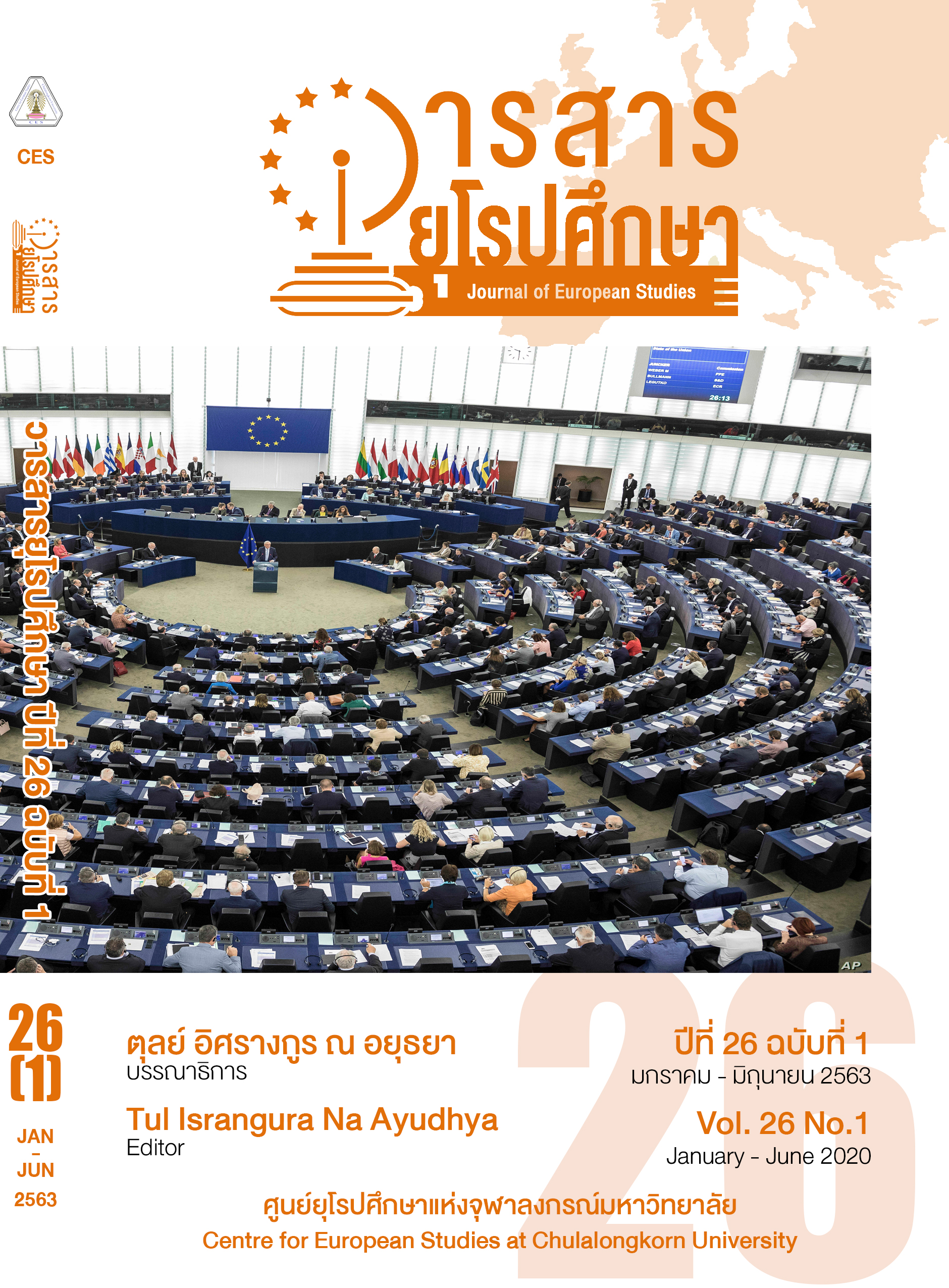นโยบายของประเทศหน้าด่านในการรับผู้ลี้ภัยจากซีเรีย:
กรณีศึกษาการตอบสนองของรัฐบาลกรีซ 2015-2017
คำสำคัญ:
ผู้ลี้ภัย, วิกฤตการณ์ผู้ลี้ภัย, รัฐบาลกรีซ, สหภาพยุโรป, กระบวนการยุโรปภิวัฒน์บทคัดย่อ
บทความชิ้นนี้เป็นการนำเสนอการตอบสนองของรัฐบาลกรีซต่อวิกฤตการณ์ผู้ลี้ภัยในปี2015-2017ผ่านกระบวนการยุโรปภิวัตน์ (Europeanization) อันเป็นแนวความคิดที่อธิบายถึงแนวทางการดำเนินการของสหภาพยุโรปให้มีความสอดคล้องและเป็นอันหนึ่งอันเดียวกันภายในภูมิภาค ซึ่งสามารถที่จะมีอิทธิพลต่อแนวทางพฤติกรรมของเหล่าประเทศสมาชิกในการดำเนินการทางด้านต่างๆ รวมถึงการดำเนินนโยบายของแต่ละประเทศสมาชิก ผ่านการอธิบายถึงการตอบสนองของรัฐบาลกรีซและปัจจัยที่ส่งผลต่อการดำเนินนโยบายผู้ลี้ภัยของรัฐบาลกรีซในช่วงวิกฤตการณ์
จากการศึกษาพบว่าปัจจัยที่ส่งผลต่อการดำเนินนโยบายของรัฐบาลกรีซในช่วงวิกฤตการณ์มี2ประเด็นคือ 1. สภาวะความกดดันจากสถานการณ์ภายในประเทศ อันเกิดจากปัญหาทางเศรษฐกิจที่กรีซต้องเผชิญมาอย่างยาวนานและบริบททางสังคมที่มีการเปลี่ยนแปลงไปและส่งผลกระทบต่อการรับผู้ลี้ภัย2. บทบาทของประเทศสมาชิกในสหภาพยุโรป คือบทบาทของแต่ละประเทศสมาชิกที่จะส่งผลต่อความร่วมมือในการแก้ไขปัญหาที่เกิดขึ้นจากการวิกฤตการณ์ผู้ลี้ภัย
เอกสารอ้างอิง
Asylum Information Database, “Country Report: Greece.” Last modified December 31, 2018. https://www. asylumineurope.org/reports/country/Greece (accessed on July 30, 2019).
Beirens, Hanne. Cracked Foundation, Uncertain Future: Structural Weaknesses in the Common European System (Migration Policy Institute Europe, 2018).
Borzel, Tanja A. and Panke, Diana. “Europeanization” In European Union Politics, edited by Cini, Michelle and Borragán, Nieves Pérez-Solórzano, 115-154. Oxford University Press, 2019.
“By refusing refugees, Poles, Hungarians and Czechs ‘broke EU law.” Aljazeera, April 3, 2020. https://www.aljazeera. com/news/2020/04/refusing-refugees-poles-hungar¬ians- czechs-broke-eu-law-200402222927579.html (accessed on April 20,2020).
Council of the European Union. “EU-Turkey Statement: 18 March 2016.” Last Modifiled March 18, 2016. https://www.consilium.europa.eu/en/press/press-re-leases/2016/03/18/eu-turkey-statement/ (accessed on December 15, 2019).
Crawley, H., Duvell, F. Jones, K. and Skleparis, D. “Under¬standing the dynamics of Migration to Greece and the EU: drivers, decisions and destinations.” MEDMIG Research Brief No.2. http://www.medmig.info/wp-con¬tent/uploads/2016/12/research-brief-destination-eu¬rope.pdf (accessed on June 9, 2019).
European Stability Initiative. “The Refugee Crisis through Statistics.” https://www.esiweb.org/pdf/ESI%20%20 The%20refugee%20crisis%20through%20statistics%20 -%2030%20Jan%202017.pdf (accessed on August 20, 2019).
Knill, Christoph and Lehmkuhl, Dirk. “How Europe Matters. Different Mechanisms of Europeanization.” SSRN Electronic Journal Vol. 3, No. 6 (1999): 1-19. http:// eiop.or.at/eiop/texte/1999-007a.htm.
Official Journal of European Union. “Directive 2013/32/EU of the European Parliament and of the Council of 26 June 2013 on common procedures for granting and withdrawing international protection.” Last Modified June 29, 2013. https://eur-lex.europa.eu/legal-content/EN/TXT/PDF/?uri=CELEX¬:32013L0032&from=en. (accessed on March 25, 2020).
Official Journal of European Union. “Regulation (EU) No 603/2013 of the European Parliament and of the Council of 26 June 2013 on the establishment of ‘Eurodac’ for the comparison of fin¬gerprints for the effective application of Regulation (EU) No 604/2013 establishing the criteria and mechanisms for determining the Member State responsible for examining an application for international protection lodged in one of the Member States by a third-country national or a stateless person and on requests for the comparison with Eurodac data by Member States’ law enforcement authorities and Europol for law enforcement purposes, and amending Regulation (EU) No 1077/2011 establishing a European Agency for the operational management of large-scale IT systems in the area of freedom, security and justice.” Last Modified June 29, 2013,https://eur-lex.europa. eu/legalcontent/EN/TXT/PDF/?uri=CELEX:32013R0 603&from=EN. (accessed on March 28, 2020).
Official Journal of European Union. “Regulation (EU) No 604/2013 of the European Parliament and of the Council of 26 June 2013 establishing the criteria and mechanisms for deter¬mining the Member State responsible for examiningan application for international protection lodged in one of the Member States by a third-country national or a stateless person 2013.” Last Modified June 29, 2013. https://eur-lex.europa.eu/LexUriServ/LexUriServ. do?uri=OJ:L:2013:180:0031:0059:EN:PDF. (accessed on March 28, 2020).
Radaelli, Claudio M. “The Europeanization of Public Policy.” In The Politics of Europeanization, edited by Feather¬stone, Kevin and Radaelli, Claudio M., 27-56. Oxford University Press, 2003.
Supang Chantavanich. Glossary of Refugee and Migration Terms. Institute of Asian Studies Chulalongkorn University, 1999. (in Thai)
Triandafyllidou, Anna. and Gropas, Ruby. European Immi¬gration: A sourcebook. Routledge, 2007.
UNHCR, “Operational Portal Refugee Situations: Greece.” Last modified n.d. https://data2.unhcr.org/en/situa¬tions/mediterranean/location/5179 (accessed on July 27, 2019).
UNHCR: The UN Refugee Agency. “Refugees & Migrants Arrivals to Europe in 2017.” Last modified February 16, 2018. http://data2.unhcr. org/es/documents/download/62023. (accessed on July 27, 2019).
UNHCR. “The Sea Route to Europe: The Mediterranean Passage in the Age of Refugee.”Last modified July 1, 2015. https://www.unhcr.org/protection/oper-ations/5592bd059/sea-route- europe-mediterra¬nean-passage-age-refugees.html (accessed on October 17, 2018).
Vasilaki, Rosa. “How Greece Became Europe’s “Shield” Against Refugees.” Jacobin March 03, 2020. https:// jacobinmag.com/2020/03/greece-refugees-europe¬an-union-migrants-turkey-border (accessed on March 25, 2020).



